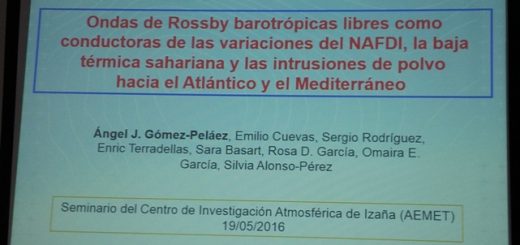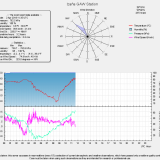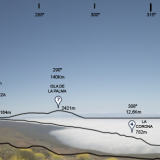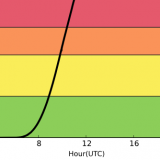Seminar Abstract: Isotopic composition study of the precipitation and the water vapour in the subtropical region, Canary Islands
This seminar is a general rehearsal with audience of the PhD dissertation that will be defended by Elisa Sosa at La Laguna University on 1 February 2016. The next paragraphs contain the TESEO abstract of the PhD dissertation.
Isotope hydrology is an emerging field of research. There is a relation between hydrogen and oxygen stable isotopes with climate parameters and atmospheric circulation patterns. Therefore, the change in the isotopic composition of precipitation is a sensitive tool for studying climate in the present (climatology), in the past (paleoclimatology) and in the future (climate change). Water molecules can incorporate different isotopes for both, hydrogen and oxygen. DHO and H218O are the most relevant in isotopic investigations, due to its greater abundance. Because of the mass difference, the most studied ratios in isotopic studies are 18O/16O and D/H. Water isotopic fractionation provides information about physical, chemical and kinetic processes which affect water molecules when they are transported through the different stages of the hydrologic cycle.
In Canary Islands, studies based on isotopic composition have been carried out for supporting hydrogeological studies, but none of them have a period of study as longer as the present one neither simultaneous precipitation and water vapour samples had been collected previously. This study seeks to characterize the isotopic composition of atmospheric water in Tenerife for precipitation and water vapour. Three different measurement stations are used in this study: in all of them precipitation is collected, but only in one of them water vapour samples (using a sublimation technique) are collected. Due to the location of the stations, the characterization of both, the marine boundary layer and the free troposphere, is possible. The backward-trajectories that arrive to the different stations are analysed with the purpose of knowing the air mass history because of its influence on isotopic composition. Altitudinal gradients are calculated using precipitation measurements. Finally, the trend of the isotopic composition in the sampling period is studied.
The obtained results agree with previous studies and with what is expected for subtropical islands. The meteoric line slope has a value equal to the global value eight or slightly lower. A positive correlation between the isotopic composition of precipitation and temperature is found and an inverse relation is found with the amount of precipitation. The isotopic composition of the water vapour samples analysed is due to the mixing of different air masses, which have different origins. When backward-trajectories are analysed, it is found that large values of 18-oxygen and deuterium have their origin in the North Atlantic Ocean while impoverished values come from African Continent. The trends found in the period of study are positive and are in concordance with the variations in atmospheric parameters related with isotopic composition and which are affected by climate change, as temperature, precipitation and mixing ratio.







